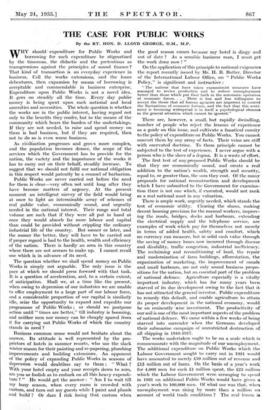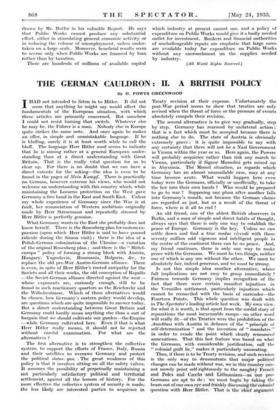THE CASE FOR PUBLIC WORKS
By the RT. HON. D. LLOYD GEORGE, 0.M., M.P.
wiry should. expenditure for Public Works and V borrowing for such expenditure be stigmatized by the timorous, the ,didactic and the pretentious as transgressions against the principles of sound finance ? That kind of transaction is an everyday experience in business.. Call the works extensions, and the loans debentures, then expansion by means of borrowing is acceptable and commendable in business enterprise. Expenditure upon Public Works is not a novel idea. It . goes on steadily all the time. • Every day public money is being spent upon, such national and local amenities and necessities. The whole question is whether the works are in the public interest, having regard not only to the benefits they confer, but to the means of the community which bears the burden of the undertakings. If they are not needed, to raise and spend money on them is bad business, but if they are required, then not to do so is even worse business.
As civilization progresses and grows more complex, and the population becomes denser, the scope of the services which the Government has to provide for the nation, the variety and the importance of the works it has to carry out on their behalf, steadily increase. To suggest that we shOuld not fulfil our national obligation in this respect would patently be a counsel of barbarism.
Public Works are never carried out before the need for them is clear—very often not until long after they have become matters . of urgency. At the present moment an intelligent survey of the field would bring at once to light an interminable array of schemes of real public value, economically sound, and urgently needed in the national interest.. Their range and total volume are such that if they were all put in hand at once they would absorb far more labour and capital than could be provided without crippling the ordinary industrial life of the country. But sooner or later, and the sooner the better, they will have to be carried out if proper regard is had to the health, wealth and efficiency of the nation. There is hardly an area in this country where there are not arrears to make up. I cannot recall one which is in advance of its need.
The question whether we shall spend money on Public Works is simply not arguable. The only issue is the pace at which we should press forward with that task. It is a question of acceleration, and, to a certain extent, of anticipation. Shall we, at a time like the present, when owing to depression of our industries we are unable to offer employment to a large part of our labour force, and a considerable proportion of our capital is similarly idle, seize the opportunity to expand and expedite our programme of Public Works ; or should we postpone action until " times arc better," till industry is booming, and neither men nor money can be cheaply spared from it for carrying out Public Works of which the country stands in need ?
Business common sense would not hesitate about the answer. Its attitude is well represented by the pro- prietors of hotels in summer resorts, who use the slack winter season for their painting and re-papering, plumbing improvements and building extensions. An opponent of the policy of expanding Public Works in seasons of depression would doubtless say to them " What ? With your hotel empty and your receipts down to zero, are you so foolish as to embark on all this heavy expendi- ture " He would get the answer : " Am I to wait till my busy season, when every room is crowded with custom, and turn out my guests while I paint and plumb and build ? Or dare I risk losing that custom when the good season comes because my hotel is dingy and out of date ? As a sensible business man, I must get the work done now ! "
On the application of this principle to national exigencies the report recently issued by Mr. H. B. Butler, Director of the International Labour Officer on " Public Works Policy," is significant. and instructive :
" The nations that have taken expansionist measures have managed to revive production and to reduce unemployment better than those which put their faith in the automatic operation of economic forces. . . . There is less and less willingness to accept the thesis that all human ag3ncies are impotent to control the fluctuations of economic fortune, and the fact that this senti- ment is .beceining widespread is in itself a- psychological element in the general situation which cannot be ignored."
There are, however, a small, but rapidly dwindling, number of people who reject the lessons of experience as a guide on this issue, and cultivate a fanatical enmity to the policy of expenditure on Public Works. You cannot convert them by any array of facts. Their veins are stiff with enervated doctrine. To them principle cannot be subjected to the test of experience. I never argue with a person who is the slave of a dogma. It is a waste of effort.
The first test of any proposed Public Works should be that they are economically sound,' and create a real addition to the nation's wealth, strength and security, equal to, or greater than, the sum they cost. Of the many proposals for national reconstruction and development which I have submitted to the Government for examina- tion there is not one which, if executed, would not rank as a real national asset in any valuation.
There is ample work, urgently needed, which Stands the test of economic utility. Clearing the slums, making decent housing provision for the manual workers, improv- ing the roads, bridges, docks and harbours, extending the electrical' supply and the telephone service, are examples of work which pay for themselves not merely in terms of added health, safety and comfort, which no currency can measure, but in solid cash value through the saving of money losses now incurred through disease and disability, traffic congestion, industrial inefficiency. The reclaiming and reconditioning of land, the repair and modernization of farm buildings, afforestation, the organization of marketing, the improvement of canals and small harbours, are not only sound business propo- sitions for the nation, but an essential part of the problem of national defence. Agriculture especially is a vitally important industry, which has for many years been starved of its due development owing to the fact that it has not attracted the general investor. Public expenditure to remedy this default, and enable agriculture to attain its proper development in the national economy, would be an eminently wise investment. The productivity of Our soil is one of the most important aspects of the problem of national defence. We came within a few weeks of being starved into surrender when the Germans developed their submarine campaign of unrestricted destruction of all shipping in 1916-1917.
The works undertaken ought to be on a scale which is commensurate with the magnitude of our unemployment. The additional expenditure on Public Works which the Labour Government sought to carry out in 1931 would have amounted to merely £10 million out of revenue and z15 million out of loans. On the basis of a year's work for 4,000 men for each £1 million spent, the £25 million which the Labour Government were arranging to spend in 1931 on additional Public Works would have given a year's work to 100,000 men. Of what use was that, when unemployment_ was rising by more than a million on account of world trade conditions ? The real lesson is drawn by Mr. Butler in his valuable Report. He says that Public Works cannot produce any substantial effect, either in stimulating general economic activity or in reducing the volume of unemployment, unless under- taken on a large scale. Moreover, beneficial results seem to accrue only when Public Works are financed by loan rather than by taxation.
There are hundreds of millions of available capital which industry at present cannot use, and a policy of expenditure on Public Works would give it a badly needed outlet for investment. Bankers and financial authorities of unchallengeable repute are emphatic that large sums are 'available today for expenditure on Public Works without any encroachment on the ' supplies needed by industry.
[All World Rights Reserved.]















































 Previous page
Previous page